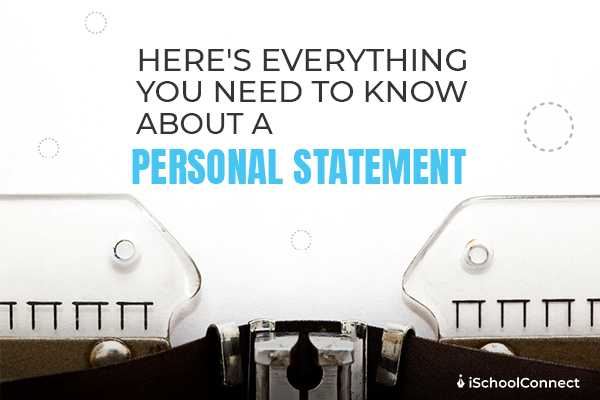Table of Contents
Prospective companies or institutions may seek a personal statement outlining your qualifications for a position or degree program. A strong statement is an excellent way to demonstrate your strengths and goals to a potential employer or university. A statement might help you stand out from the crowd and get a new job or college position. In this post, we’ll go through how to write a powerful personal statement for a job or university application.
What is the definition of a personal statement?
In job applications or resumes, a personal statement is a description of your qualifications, abilities, interests, and aspirations. Personal statements for university and job include comparable substance, however, university personal statements are often lengthier and more comprehensive. They are usually three to four pages long.
These comments are one paragraph long when included in job applications and resumes. Employers and institutions may have their standards, so be aware of any word or character limits.
What is the best way to write a personal statement?

Writing a compelling statement for a job or university placement might be made easier if you break the effort down into simple, achievable sections. While you should write your introduction, body, and conclusion in that sequence, do it in a way to make it impactful.
For example, writing the body of your statement first and then returning to writing the introduction might help you produce a stronger beginning since you already know what the remainder of your statement is about.
The following approach ensures that you include all necessary elements and that each phrase is as effective as possible:
Personal introduction
Write an introduction that represents you and your personality. It should explain why you are interested in the career or degree, as well as any recent experience you have had with the work or course themes, if applicable. Starting a personal statement with lines that demonstrate who you are might encourage the receiver to continue reading.
Consider discussing what piqued your attention in the job description in your application. Include the most important parts of your personality and interests in the career or firm in a single, forceful statement. If you’re applying to a university, talk about how the program or school aligns with your interests. The introduction to your university should take up a full paragraph.
Expand on relevant skills, interests, and experiences
Below is a list of elements that you can include in your statement.
Experience and accomplishments
Write about your degrees, certificates, honors, years in the industry, and jobs you’ve held that are relevant to the job’s duties or the university’s educational programs.
Skills and abilities
Summarize the talents and skills you’ve acquired at university or during your career. Consider discussing particular abilities mentioned in a job description or the values the institution seeks in candidates.
Professional or academic objectives
Write about how the job or course you’re applying for aligns with your long-term goals. Choose a clear objective that the job or course can assist you in achieving.
Why do you think you’d be a good fit for the organization?
You might want to talk about your previous work experience or your desire to learn certain skills, complete tasks, or gain qualifications in a profession.
Always keep your personal statement brief, especially the body. It should not be longer than two sentences. Just mention a couple of skills in the body to keep it crisp.
In case you are a new school graduate, just highlighting one paragraph of your professional experience and ability in your chosen field is sufficient. However, if you are seeking an advanced degree, then write more than one paragraph.
Write an effective and strong conclusion

End your personal statement with a powerful conclusion to make a lasting impression on a prospective employer or university admissions officer. Make it a concise description of why you applied and what you want to gain from the experience. It should also persuade the reader to review your resume and academic qualifications to learn more about you as a candidate.
You can add the following in this portion of your personal statement-
Your professional goals for future
- Some personal statements, especially the ones where you apply for a job, may include specific references to your goals and how the position you are applying for can help you achieve those goals.
- While writing a personal statement for a college or university, reinforce how the school’s mission or coursework can prepare you for a career.
- In both statements, consider mentioning short and long-term goals.
- For example, what do you hope to achieve while studying or working in that position and where do you see yourself in the near future?
Summary of your personal statement
- Be it a one-sentence conclusion or longer, a concise summary of the important points in your personal statement might be effective.
- Make a direct link between your accomplishments, experiences, and talents and your future contributions to the firm or university.
Link back to introduction
- Refer to the introduction of your personal statement and what made you pick this particular job or degree in case it is a university application.
- Also, it would help if you include your academic qualifications with your desires.
- Concluding a personal statement with enthusiasm and excitement will be a major factor that would influence a company or university to consider your candidacy seriously.
Edit and proofread
- Take the time to review and modify your personal statement when you’ve finished writing it.
- Read out loud your personal statement to hear how it sounds and identify places where you may improve.
Writing a strong personal statement: some tips
Personal statements with a personal yet professional tone and relevant, direct information are the most effective. Understanding the characteristics of excellent personal statements might assist you in writing your own. When developing your personal statements, keep the following suggestions in mind.
- Write from your viewpoint
- Keep it simple
- Have a positive tone
- Use active voice
- Be unique
Key takeaways
- The true objective of a personal statement is to promote you. In other words, write in such a way to make your application the best possible way.
- You must demonstrate that you understand the nature of the work when writing a personal statement for a job application. When writing a personal statement, you must also demonstrate that you understand the position for which you are seeking.
- Your personal statement should emphasize what makes you stand out from the crowd and why the employer/school/college/university should choose you above the other applicants.
We hope you enjoyed reading this blog post. If you have any doubts, you can reach us here.
You can also share your thoughts by leaving a comment below.
Liked this blog? Read next: How to write the perfect resume for university applications
FAQs
Q1. Are titles required in personal statements?
Answer – A personal statement does not require a title. Graduate school applications require one, as well as the paper, should speak for itself in terms of its contents.
Q2. What is the ideal length of a personal statement?
Answer – The length of your personal statement might be up to 4,000 characters. Ideally, a word limit of roughly 550–1000 words with spaces. Keep it short and sweet, and make sure it’s easy to understand.
Q3. Is it possible to plagiarize your personal statement?
Answer – If a personal statement contains 60% or more plagiarized material, Admissions will review the application. However, the applicant will be warned about plagiarism and its severity.






